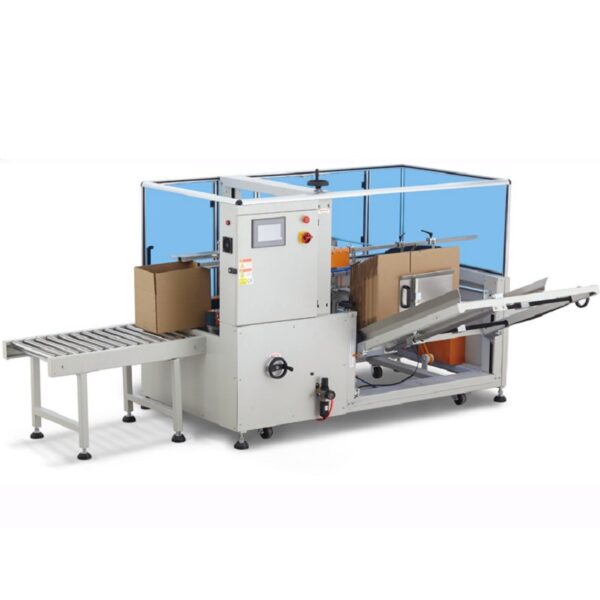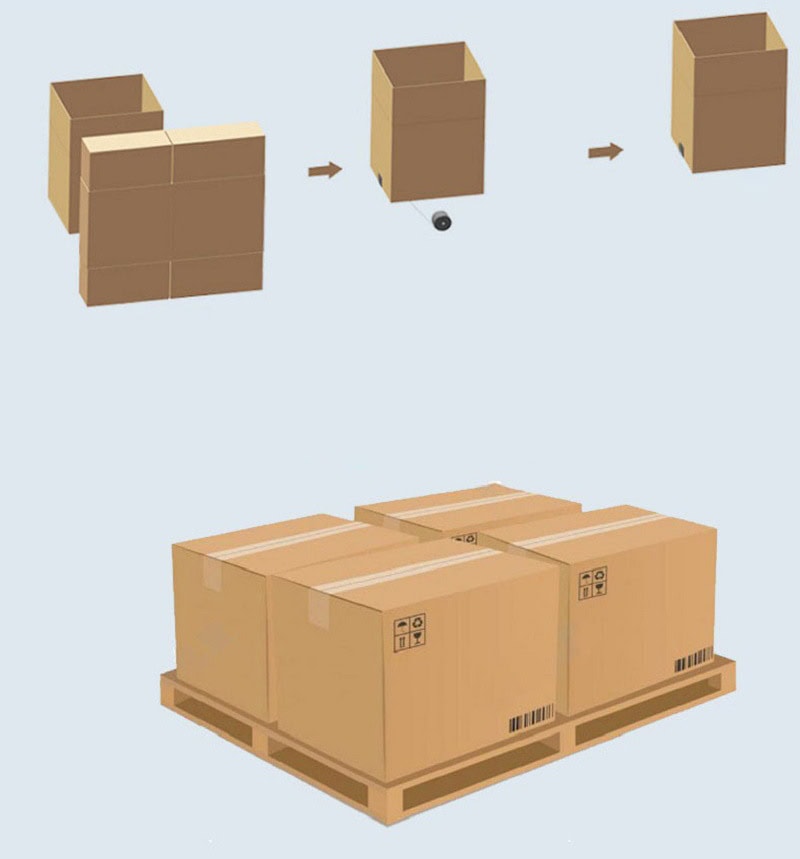Automatic case erector machines solve the problem of manual labor inefficiencies in packaging, leading to production delays and increased costs. They help businesses streamline their packaging operations, improve output, and ensure high consistency in case formation.
An automatic case erector machine is designed to automatically assemble flat-packed boxes into ready-to-use cases for packaging various products. These machines are widely used across industries to enhance productivity and reduce manual effort.
Keep reading to discover how automatic case erectors optimize packaging processes.

Key Features of Automatic Case Erectors
Speed and Efficiency
Automatic case erector machines significantly enhance packaging speed compared to manual processes. With the ability to assemble several boxes per minute, these machines are ideal for operations that demand high output. Businesses utilizing an automatic case erector can increase their throughput, meeting tight deadlines and handling large volumes of product shipments without compromising on quality.
Versatility and Precision
One of the standout features of automatic case erectors is their versatility. They are compatible with a variety of box sizes and can be adjusted to handle different shapes and designs. This adaptability makes them a valuable asset for companies that package diverse products, such as food, electronics, and consumer goods. Moreover, these machines ensure precise folding and sealing, providing consistent results with each case, which minimizes the risk of product damage during transport.
Benefits of Using an Automatic Case Erector
Labor Cost Reduction
One of the primary advantages of automatic case erectors is their ability to reduce labor costs. By automating the repetitive task of forming boxes, businesses can allocate their workforce to more value-added activities, leading to operational efficiency. This also minimizes the chances of errors or inconsistencies associated with manual labor, resulting in fewer rejected products or damaged shipments.
Increased Throughput and Quality Control
Automatic case erectors not only boost production speed but also maintain uniformity in the packaging process. The machine ensures that every box is assembled to the same specifications, maintaining high-quality standards. This uniformity is crucial for ensuring that products are safely packaged, reducing the likelihood of issues during shipping and delivery.

Applications Across Industries
Food and Beverage
In industries such as food and beverage, where products like canned goods, beverages, and packaged foods need secure and precise packaging, automatic case erectors are indispensable. They ensure that every product is safely enclosed in a durable case, ready for distribution.
Electronics and Pharmaceuticals
Electronics and pharmaceutical industries rely on precision when packaging delicate components and medicines. Automatic case erectors provide the accuracy needed to handle such sensitive products, ensuring they are packed securely to avoid damage or contamination during shipping.
Types of Automatic Case Erectors
Standard Case Erectors
Standard case erectors are the most common type and are used for handling regular slotted cases (RSC). These machines are ideal for businesses that require consistent, straightforward box assembly.
High-Speed Case Erectors
For industries with high production demands, high-speed case erectors offer the capability to assemble boxes at a rapid rate. These machines are perfect for large-scale operations that need to package thousands of products daily.
Vertical Case Erectors
Vertical case erectors are designed for operations that have specific packaging configurations or limited floor space. They help in forming boxes vertically, which is useful for businesses with specialized packaging requirements.
Considerations for Selecting a Case Erector
Production Speed Requirements
When choosing a case erector, it’s essential to assess the speed at which the machine can operate. The machine’s speed must align with the business’s production goals to ensure efficient operations. A faster machine can significantly improve productivity, especially in industries like food and beverage, where packaging demands are high.
Integration with Existing Systems
Another critical consideration is the compatibility of the case erector with existing packaging systems. Ensuring that the machine integrates seamlessly with other packaging equipment like a labeling machine or filling machine can streamline operations, reduce downtime, and enhance overall efficiency.
Maintenance and Operational Tips
Regular Maintenance
To ensure the longevity of an automatic case erector machine, it’s essential to follow the manufacturer’s maintenance guidelines. Routine checks, lubrication, and timely part replacements help in maintaining optimal performance and preventing costly breakdowns.
Operator Training
Proper training for operators is crucial for the effective use of the machine. Trained personnel can troubleshoot issues quickly and ensure the machine is running at peak efficiency, minimizing downtime.
Future Trends in Case Erector Technology
Advancements in Automation
The future of packaging technology is likely to see increased automation, with more intelligent systems integrating robotics and artificial intelligence to further streamline packaging processes. These advancements will allow machines to handle more complex tasks, reducing human intervention even further.
Sustainability and Customization
As businesses shift towards more sustainable practices, case erectors will evolve to accommodate eco-friendly packaging materials. Additionally, companies will demand more customization in packaging solutions, pushing the development of machines that can handle a broader range of packaging designs and materials.
Conclusion
Automatic case erector machines are transforming packaging operations across various industries by increasing efficiency, reducing labor costs, and improving quality control. With advancements in automation and sustainability, these machines will continue to play a vital role in modern manufacturing and packaging processes.









